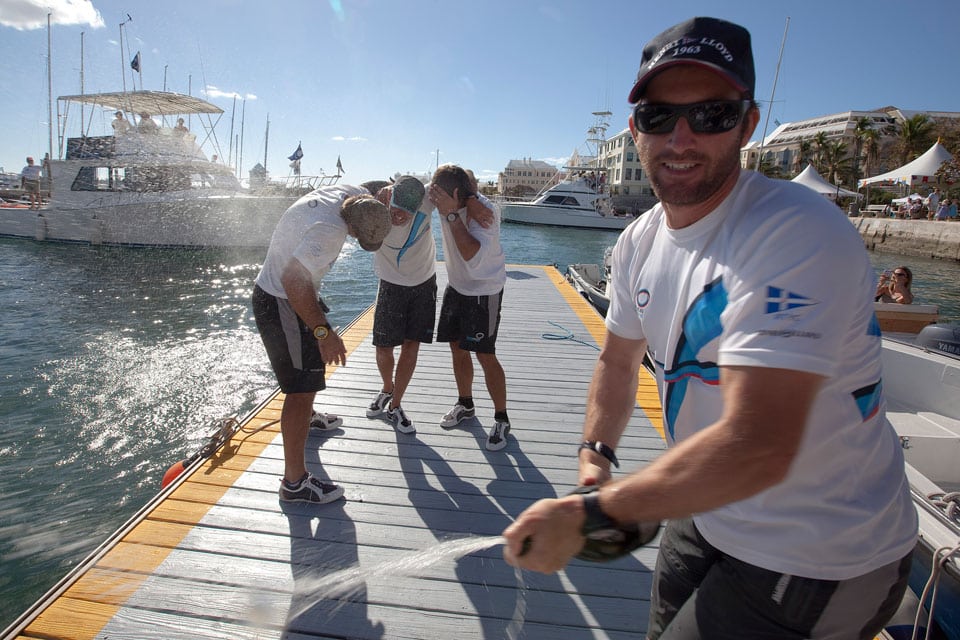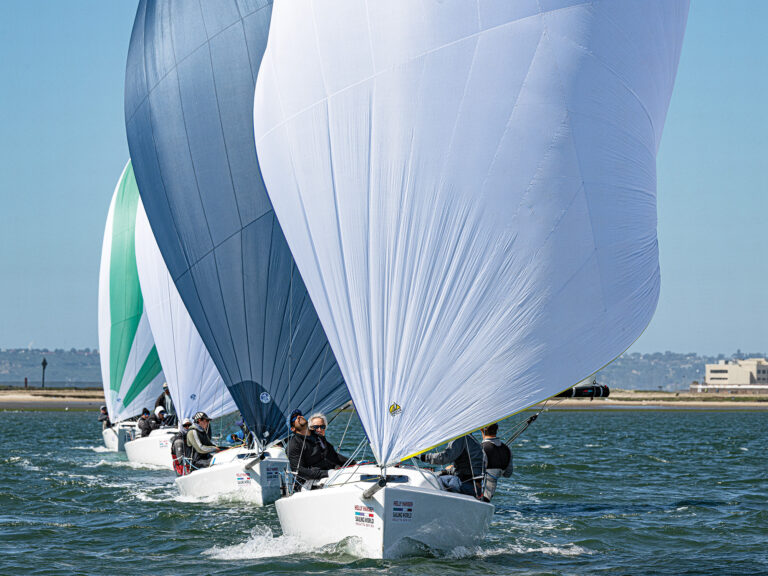
Ainslie960
The day before leaving to compete in the Argo Group Gold Cup in Bermuda, Ben Ainslie received notice that he and the rest of his teammates on the TeamOrigin America’s Cup syndicate were officially unemployed. Faced with turning a monohull team into a multihull contender, TeamOrigin founder Sir Keith Mills abruptly pulled the plug on the project.
Ainslie, who has the America’s Cup high on his list of career goals, was crushed. “It’s bad enough if you don’t race well and don’t reach your goal,” he said, “but if you don’t even get to the start line, it is totally disappointing.”
But the 33-year-old Brit didn’t let the ambiguity surrounding his Cup future affect his performance at the Gold Cup. The four-time Olympic medalist (3 gold, 1 silver) led his TeamOrigin crew to the championship with a 3-1 win over Danish veteran Jesper Radich in the finals. He is the first sailor since Russell Coutts in 1992 and ’93 to win back-to-back Gold Cup titles.
**When BMW Oracle Racing announced it was going with multihulls for the 34th America’s Cup, did you see the decision as the end of an era, so to speak, for British sailing?
**We wanted to bring the Cup back to England, and set things right in an event we originated. But, in the end, for Sir Keith Mills, we couldn’t continue that heritage within the new format. It was a very British team and we worked very hard for three years to move it forward. We were all quite positive about our options. Ultimately, it was Sir Keith Mill’s decision. He took it with the feeling that it wasn’t a viable project anymore. As a team, we felt we were viable. It would be a steep learning curve to become top multihull sailors, but we were ready for that challenge. For Sir Keith, I think, the event was getting farther and farther from where we started. It is such a good group of people, and it is a shame that it can’t happen.
**Do you think he should have handled things differently?
**Sir Keith is someone I have a lot of respect for. It’s his team, his money, after all. He has a lot of experience in sport. I think the problem at the moment is the America’s Cup wasn’t the fashionable thing to do. It also may have to do with the proximity of [the Cup in 2013 to] the 2012 Olympics. I am sorry we couldn’t make it happen.
Does this make your own situation easier now that you can focus solely on the 2012 Olympics?
I was in a difficult position before. I guess I don’t have to face that problem now. However, it is unfortunate that they picked 2013 for the event and that was probably one of the big reasons that Sir Keith pulled out. My goal right now is to go back to the gym and start training for the Olympics.
**
How difficult would it be for you to become a top multihull helmsman?**
Although it would be a steep learning curve to become a top multihull sailor, it takes 18-months to two years, I think. It might be more expensive to start over and train sailors to become multihull experts. But if you start going out in the A class cats, after a good year of racing you are going to improve a lot. It is important to get out in them and race. Getting that experience and exposure is key.
**Will multihull sailing gain a little more prestige with the America’s Cup moving to a 72-foot catamaran?
**There was a feeling in the past about multihull sailors not being as steeped in the traditions of sailing, or being as good at match racing. That will change. Plus, the level of skill in multihulls will change quite a lot as more and more top sailors will probably move over from monohulls.
**Russell Coutts and Larry Ellison are promising a revolution for the America’s Cup. What do you think of their vision for the future of sailing?
**My biggest concern as a professional sailor is that there has been a huge push to commercialize our sport. I fear that in the near future the races will have to fit into a 35-minute television schedule, that if the race won’t be over in 30 minutes, they won’t even race it. It is not really the way for sailors to compete.
**What is the future of monohull match racing?
**Obviously there are lots of opinions about where match racing is going now that the America’s Cup has switched to multihulls. We will all have to wait and see. I love this kind of match racing, especially here in Bermuda. It is a lot more classic match racing with evenly matched boats and tough conditions on the racecourse, requiring tactics and match-racing skills. The traditional events like the Argo Group Gold Cup are really important to the sport.
**Your father was a Whitbread sailor; do you have any desire to compete in the Volvo Ocean Race?
**The biggest goal in my life has been the Olympics, but I certainly do see the Volvo as a goal of mine, too. It is an endurance game and holding a team together, making a fast boat win in one of those races, is an achievement in itself and is not something I would rule out.
**You took a phone call from Russell Coutts just after Sir Keith’s announcement? Did he offer you a job? Will he offer you a job?
**No. He just called to find out what had happened, what was going on. It seems like they were as surprised about TeamOrigin dropping out of the competition as we were.
**Multihull Reaction
**”Match racing is best when it is more akin to a chess game with the boats are evenly matched. Instead of depending on pure boat speed a slower boat can win a race with superior tactics and rules application. Take that away, and I’m not sure what we have left except two extremely fast, extremely expensive multihulls tearing around the course.”
—Royal Bermuda YC commodore and international match-race judge Peter Shrubb on the switch to multihulls for the 34th America’s Cup.









